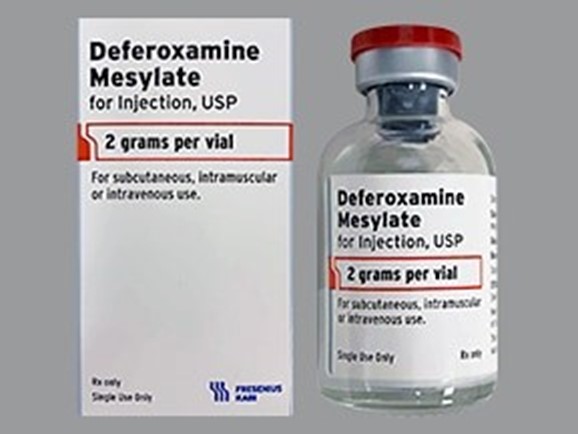A nurse at a pediatrician's office is contacted by a parent whose child just ingested half a bottle of vitamins with added ferrous sulfate.
Which of the following instructions should the nurse provide to the parent?
Bring the child to the office for a rapid infusion of deferoxamine.
Give the child syrup of ipecac.
Contact the poison control center.
Provide a high-carbohydrate meal.
The Correct Answer is C
In the event of a potential poisoning, the first step should be to contact the poison control center for guidance on how to proceed.
Choice A is not correct because rapid infusion of deferoxamine is not the first step in managing iron overdose.
Choice B is not correct because syrup of ipecac is no longer recommended for use in cases of poisoning.
Choice D is not correct because providing a high-carbohydrate meal is not an appropriate intervention for iron overdose.

Nursing Test Bank
Naxlex Comprehensive Predictor Exams
Related Questions
Correct Answer is C
Explanation
In the event of a potential poisoning, the first step should be to contact the poison control center for guidance on how to proceed.
Choice A is not correct because rapid infusion of deferoxamine is not the first step in managing iron overdose.
Choice B is not correct because syrup of ipecac is no longer recommended for use in cases of poisoning.
Choice D is not correct because providing a high-carbohydrate meal is not an appropriate intervention for iron overdose.

Correct Answer is C
Explanation
The correct answer is C. 2 mL/kg/hr.
Choice A rationale: An output of 0.5 mL/kg/hr is insufficient and indicative of ongoing dehydration or inadequate fluid intake.
Choice B rationale: An output of 15 mL/kg/hr is excessive and could suggest overhydration or a different pathology.
Choice C rationale: A urinary output of 2 mL/kg/hr is an ideal measure for indicating that fluid balance has been restored in infants.
Choice D rationale: An output of 7.5 mL/kg/hr is unusually high and not typical for a corrected fluid balance in infants.
Whether you are a student looking to ace your exams or a practicing nurse seeking to enhance your expertise , our nursing education contents will empower you with the confidence and competence to make a difference in the lives of patients and become a respected leader in the healthcare field.
Visit Naxlex, invest in your future and unlock endless possibilities with our unparalleled nursing education contents today
Report Wrong Answer on the Current Question
Do you disagree with the answer? If yes, what is your expected answer? Explain.
Kindly be descriptive with the issue you are facing.
